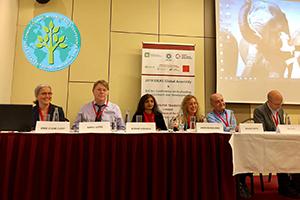3rd International Conference (2019)
The GEF Independent Evaluation Office (IEO) together with the Earth-Eval Community of Practice (CoP) organized the Third International Conference on Evaluating Environment and Development in collaboration with IDEAS Global Assembly (GA). Building upon the initiatives outlined below, the 3rd International conference expanded the scope to cover topics related more broadly to the environment, including natural resources management, biodiversity conservation, land degradation, sustainable forestry, water management, as well as climate change mitigation, adaptation and carbon sequestration interventions. It will also cover sustainable development from the perspective of coupled natural and human systems, evaluating the social and economic benefits and trade-offs associated with environmental interventions. Click here to review the agenda for the event.
The focus was on successful approaches and methodologies. Lessons learned from evaluations conducted by major multilateral and bilateral development agencies and financial institutions, national organizations, research and academic institutions, and the private sector.
The conference brought together leading practitioners and thinkers on environmental evaluation from the international and national public organizations in the North and the South, the academic community, environmental organizations and thinktanks, civil society and the private sector. The participants shared concrete experiences with environmental interventions and their evaluations.
Background
Environmental policies, strategies, programs and projects (henceforth referred collectively to as interventions) pose specific challenges for evaluators who must deal with issues such as:
- Time horizons, which frequently differ between natural and social systems, and timebound interventions;
- Scales, that may be at different spatial levels and often do not adhere to political and administrative boundaries;
- Data quality and credibility, including unreliable or low validity of data and investigators' biases; and,
- Research designs, including causal attribution.
These challenges are often exacerbated for interventions targeting developing countries. Yet, with increasing attention given to the universally applicable Sustainable Development Goals (SDGs) in both national and international development plans, as well as the proliferation of international financial mechanisms focusing on the environment – such as the Global Environment Facility (GEF), Green Climate Fund (GCF) and the Climate Investment Funds (CIF) – there is a growing need to measure the results and impacts of environmental interventions, as well as to identify lessons for the future. Evaluation will play a key role in this critical function, but it is imperative to further the approaches and methodologies for evaluating the environment.
The GEF Independent Evaluation Office (IEO); jointly with the Earth-Eval Community of Practice (CoP) are well-placed to take a lead in this endeavor. The GEF Evaluation Office organized the first International conference on Evaluating Climate Change and Development, hosted by the Government of Egypt in Alexandria, in 2008, at a time when attention to climate change and its effects on the environment and people was heightening. The conference identified promising approaches to evaluating climate change mitigation efforts, as well as initiated discussion on the relatively new area of adaptation, leading to the first book of its kind on these topics. The conference also led to the establishment of the Climate-Eval CoP, which has later evolved into Earth-Eval.
The second International conference on Evaluating Climate Change and Development was organized by the GEF IEO and Climate-Eval CoP in 2014 in Washington, DC. Six years had passed since the first conference during which period the impacts of climate change had become increasingly visible, interest in the topic had peaked, and evaluation knowledge had increased substantively. Consequently, the conference attracted some 300 participants and could build upon experiences from evaluations conducted by organizations such as the World Bank, Inter-American Development Bank, GEF and CIF. The process led to an authoritative book based on selected presentations at the conference developed further into substantive chapters.
In October 2017, the GEF IEO joined the Evaluation Department of Norad, together with the evaluation units of UN Environment (UNEP) and GCF, in organizing an international learning event in Oslo, Norway, on Evaluation and Learning for International Sustainable Forest Initiatives. The purpose was to identify lessons from evaluating international sustainable forest initiatives and to discuss how evaluations could contribute to shaping and strengthening the significant forest-related investments likely to made in the coming decades.
Steering Committee
- Juha I. Uitto, Director, GEF Independent Evaluation Office (Chair)
- Geeta Batra, Chief Evaluation Officer & Deputy Director, GEF IEO
- Rob D. van den Berg, President, International Development Evaluation Association (IDEAS)
- Jörg Faust, Director, German Institute of Development Evaluation (DEval)
- Karen T. Odhiambo, Lecturer & Consultant, University of Nairobi
- Anu Saxén, Director, Development Evaluation, Ministry of Foreign Affairs of Finland



